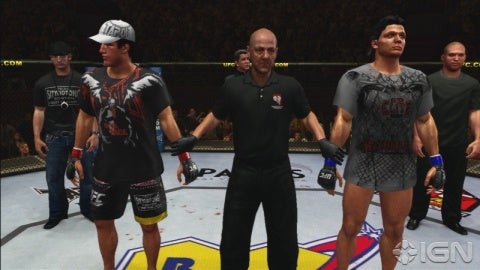Undisputed is back with a career mode spanning 12 years. You'll start as an amateur, work your way up to the UFC itself, and start building a legacy that hopefully includes a title. Along the way, you'll earn sponsors, meet Dana White, and appear at a number of meet and greets to display moves and pick winners from a PPV card.
Still, before all of that, you have to sit down and create a fighter. This time around, there are more than 100 first names, 100 last names, and 50 nicknames to assign to your character, and this is key to nailing that presentation vibe I was talking about. When you're on the mat this year, the announcers aren't just talking about your opponent; they're talking about your last match, how you've been performing as of late, and what your mindset is. Thus, they need to be able to call you by name, but you're I like big balls to enter one via text as well.
The length of your amateur career is really up to you. The game makes you compete in at least one amateur fight, but it's really so you can gauge what difficulty to play the career on. After the first fight, you can go pro with a given difficulty or experiment with one of the other ones. Pick carefully – you can't change how tough or easy your career is once you've selected one.
Once you get into the world of professional mixed martial arts as part of the World Fighting Alliance, the stat-crunching madness behind UFC's career mode comes out – most obviously with conditioning and fatigue. Similar to Undisputed 2009, you're going to have three attributes in flux at all times – strength, speed and cardio. Each week, you can choose to train just one of these in light, moderate or intense workouts. Doing the exercises increases your conditioning, but it also raises your fatigue. The goal is that by the time you step into the Octagon, your conditioning will be maxed out and your fatigue will be as low as possible. Do this, and your fighter will be in tip-top shape for the battle ahead. Screw it up, and you're a knockout waiting to happen.


You of course want to win in your career not only for the awesome looking record and sponsors but for the upgrade perks. As you play, you gain experience. When you cross a certain experience point threshold, you'll get to choose if you want to upgrade your training or your sparring. Increasing training lets you up the maximum level for two of your strength, speed and cardio stats so that you can work out more and not get as tired. Meanwhile, upgrading your sparring ability increases the power of your moves.
See, just like training, sparring is always an option you can take advantage of during your week. This was in the previous game, but it's more important here as UFC Undisputed 2010 allows you to learn new moves – any move, as you're no longer tied to one archetype. If you choose to spar, you can automatically work one aspect of your fighter's game or jump in and do it yourself for more points. In the end, you'll take your points and assign them to your specific moves' offenses or defenses. Stuff like your striking offense or your kick defense.
This plays into the new way fight camps are setup. Last year, players had to be invited to camps to learn new moves that fit their styles. This year, you can just choose to go to a camp whenever you want – one of the more than 25 real camps like Greg Jackson's Gym and Sityodtong Boston – and learn some of the 500 moves in the game. These moves have individual skill levels, so it makes sense to come back and keep leveling-up the ones you use all the time.

